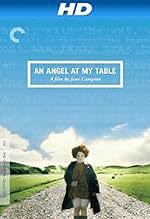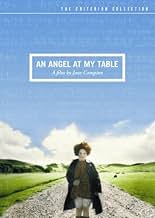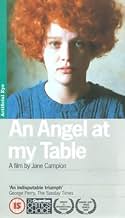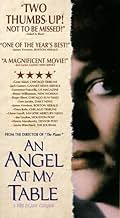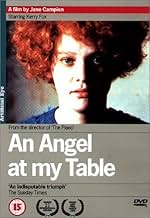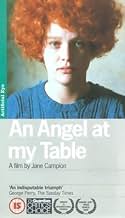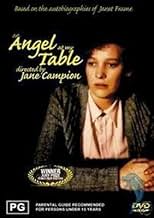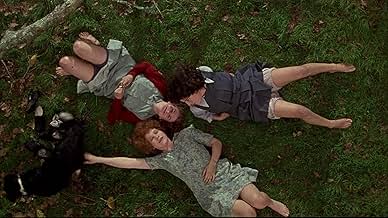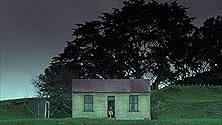IMDb-BEWERTUNG
7,4/10
9156
IHRE BEWERTUNG
Janet Frame war ein brillantes Kind, das als Teenager fälschlicherweise als schizophren diagnostiziert wurde. Erleben Sie Janets Entdeckung der Welt und ihr Leben in Europa, während ihre Büc... Alles lesenJanet Frame war ein brillantes Kind, das als Teenager fälschlicherweise als schizophren diagnostiziert wurde. Erleben Sie Janets Entdeckung der Welt und ihr Leben in Europa, während ihre Bücher unter großem Beifall veröffentlicht werden.Janet Frame war ein brillantes Kind, das als Teenager fälschlicherweise als schizophren diagnostiziert wurde. Erleben Sie Janets Entdeckung der Welt und ihr Leben in Europa, während ihre Bücher unter großem Beifall veröffentlicht werden.
- Auszeichnungen
- 19 Gewinne & 5 Nominierungen insgesamt
Kevin J. Wilson
- Father
- (as K.J. Wilson)
Empfohlene Bewertungen
"An Angel at My Table" (1990) made by Jane Campion is a true life-story of Janet Frame (1924-2004), New Zealand's most famous author. The film starts with young Jane, a funny -looking red haired girl, shy and quiet who knew too well that she was "poor, smelly, and unpopular". Then it follows her to misdiagnosis of schizophrenia and more than 200 electroshock treatments in a mental hospital where she had spent eight years and a severe, lifelong shyness that was her only problem. Even in the hospital she was writing and was able to have her book published - writing did save her from losing her mind. The film is based on three of her memoirs, "To the Is-land", "An Angel at My Table" and "The Envoy from Mirror City".
Jane Campion made a very affecting and quietly powerful portrait of a writer who also was a gentle and genuinely humble woman. The film is never a sentimental manipulating story of a talented but misunderstood artist. It does not idealize Frame but it is a very honest and sympathetic portrait of an artist.
Jane Campion made a very affecting and quietly powerful portrait of a writer who also was a gentle and genuinely humble woman. The film is never a sentimental manipulating story of a talented but misunderstood artist. It does not idealize Frame but it is a very honest and sympathetic portrait of an artist.
What do these people have in common: Lou Reed, Vivien Leigh, Yves Saint Laurent, and Janet Frame? Answer: They were all given electroconvulsive shock therapy for highly questionable reasons, and suffered because of it.
Going in to this film I'd never read anything by New Zealand author Janet Frame, but nevertheless found the story of her life to be interesting. She's a compelling figure because of how awkward she was, clearly intelligent and talented but also riddled with social anxiety. It's very well cast, with the transitions between three actresses at differing portions of her life from child to adult being seamless, and all giving good performances.
I didn't give the film a higher rating because despite coming in at 238 minutes spread out over three parts, it left me with questions about aspects of her life and somehow lacked detail in places it shouldn't have, and was probably too long in others. Transitions were often on the abrupt side, and there seemed to be a certain softening of things. Maybe that's how life is when told with a backward glance over decades though, I don't know. Anyway, it's a pretty good film, and one with an uplifting spirit to it.
Going in to this film I'd never read anything by New Zealand author Janet Frame, but nevertheless found the story of her life to be interesting. She's a compelling figure because of how awkward she was, clearly intelligent and talented but also riddled with social anxiety. It's very well cast, with the transitions between three actresses at differing portions of her life from child to adult being seamless, and all giving good performances.
I didn't give the film a higher rating because despite coming in at 238 minutes spread out over three parts, it left me with questions about aspects of her life and somehow lacked detail in places it shouldn't have, and was probably too long in others. Transitions were often on the abrupt side, and there seemed to be a certain softening of things. Maybe that's how life is when told with a backward glance over decades though, I don't know. Anyway, it's a pretty good film, and one with an uplifting spirit to it.
For some people, "An Angel At My Table' would be a VERY long sit-through. The story of one of New Zealand's most famous authors, who succeeds despite having gone through schizophrenia isn't exactly family entertainment. But although the movie runs far too long, at 2 and a half hours, I found myself engaged quite a bit as soon as the story got moving, and not a relentless character study. Janette Frame, a girl with a serious shock of red hair, grows up, realizing her passion for writing, and suffers tremendous setbacks, both emotionally and professionally. What a performance the three actresses give as Janette, we see Janette as a young girl, a teenager, and as a young adult. Although Kerry Fox is the most well known of all three, all three are tremendous here, each taking the nuances of Frame, and developing the character beautifully. As per the case of all Jane Campion's films, she knows how to frame the camera quite well, and again, although the movie IS long, it does have a lot of amazing little moments
An Angel at My Table tells the story of famed New Zealand author Janet Frame. We are drawn into the quiet world of the shy, red-haired girl who struggles with her life, but succeeds through her exceptional talent of writing. Since her autobiography was written in three separate volumes, we are treated to a film in three separate parts, beginning with her journey through childhood. The film does an excellent job at portraying the character of Frame, and her nervous attitude when brought into social situations. Every ounce of shyness is felt off-screen, which is a kudos to the direction of Campion, that plays an important part in making sure that this woman is brought to life, as realistic, and as close to the truth as possible.
Growing up in poverty, with two hard-working parents, and 4 siblings, life must've been hard. But when you're thrust into such a difficult situation, it somehow seems normal and it doesn't bother that it's a much harder life than other people currently living are. But Janet lived through her childhood, finding that she would love to spend her life as a poet, or just writing. A depression hit her hard during her teenage years when an unexpected tragedy occurred, and she had chosen to write, instead of being with that person beforehand. Not knowing she was a depressed young person, Frame was sent to a mental hospital, and forced to undergo several shock treatments, under the incorrect diagnosis of schizophrenia. However, Frame persevered through it, using writing as a way of expressing her own thoughts. While still in the mental hospital, she was able to publish a book. The years inside the hospital are the most unpleasant of film, and Campion perfectly captures the deranged conditions that Janet experienced. The most remarkable part about the direction is how it doesn't go over the top to deliver a nauseating film in those scenes. Rather, she plays to the quiet personality of Frame. The film is kept with the same pace, and focused in a way that never wants to show itself off, but keeps the main character always in the center, without losing that focus.
The blown-up biopic `Malcolm X' was released around a year later, and while I admire that film, it was also very hyped-up before it's release. I found a strange drawing power in the fact that Jane Campion's film wasn't about spectacle, but about someone's life that is done more sincerely, and realistically, paying close attention to details, both period and human. Something you wouldn't find in a Hollywood biopic, such as Milos Foreman's `Man on the Moon,' which I openly despise.
The writer and director surprised me a bit concerning a small detail in the film. In films concerning `writing', and an exceptional author (Wonder Boys, Finding Forrester), there is never any real proof of how good the writer supposedly is. We are never allowed to read the great book they wrote, nor are there much of any excerpts written to prove to us that the writer is indeed as great as it is suggested. In films, I realize that it really isn't possible to show such a thing, since film is a visual medium instead of a literary one. Campion and the screenwriter know this, and without subjecting us to Frame's writing, she adds in some narration, using actress Kerry Fox's voice. The narration is spread out in small bits throughout the film, never taking control of telling the story. Instead, it conveys the thoughts going on in Frame's mind, which are all little excerpts from the writing contained in her autobiographies. It begins with narration and ends with it. A surprising detail that is small, but adds much to the overall film, and gives the ending a sweet, and optimistic touch to an amazing film.
Frame was (is) talented at what she did most of the time, without knowing the talent was there. She only knew that she loved to do it, and wanted to continue doing it for the rest of her life. That is true talent. She had it, even at times when she thought there wasn't any hope; she had the ability to write. And because of that ability, that talent, she was able to gradually come to terms, and live comfortably with her life. ****1/2 of five or (9/10)
Growing up in poverty, with two hard-working parents, and 4 siblings, life must've been hard. But when you're thrust into such a difficult situation, it somehow seems normal and it doesn't bother that it's a much harder life than other people currently living are. But Janet lived through her childhood, finding that she would love to spend her life as a poet, or just writing. A depression hit her hard during her teenage years when an unexpected tragedy occurred, and she had chosen to write, instead of being with that person beforehand. Not knowing she was a depressed young person, Frame was sent to a mental hospital, and forced to undergo several shock treatments, under the incorrect diagnosis of schizophrenia. However, Frame persevered through it, using writing as a way of expressing her own thoughts. While still in the mental hospital, she was able to publish a book. The years inside the hospital are the most unpleasant of film, and Campion perfectly captures the deranged conditions that Janet experienced. The most remarkable part about the direction is how it doesn't go over the top to deliver a nauseating film in those scenes. Rather, she plays to the quiet personality of Frame. The film is kept with the same pace, and focused in a way that never wants to show itself off, but keeps the main character always in the center, without losing that focus.
The blown-up biopic `Malcolm X' was released around a year later, and while I admire that film, it was also very hyped-up before it's release. I found a strange drawing power in the fact that Jane Campion's film wasn't about spectacle, but about someone's life that is done more sincerely, and realistically, paying close attention to details, both period and human. Something you wouldn't find in a Hollywood biopic, such as Milos Foreman's `Man on the Moon,' which I openly despise.
The writer and director surprised me a bit concerning a small detail in the film. In films concerning `writing', and an exceptional author (Wonder Boys, Finding Forrester), there is never any real proof of how good the writer supposedly is. We are never allowed to read the great book they wrote, nor are there much of any excerpts written to prove to us that the writer is indeed as great as it is suggested. In films, I realize that it really isn't possible to show such a thing, since film is a visual medium instead of a literary one. Campion and the screenwriter know this, and without subjecting us to Frame's writing, she adds in some narration, using actress Kerry Fox's voice. The narration is spread out in small bits throughout the film, never taking control of telling the story. Instead, it conveys the thoughts going on in Frame's mind, which are all little excerpts from the writing contained in her autobiographies. It begins with narration and ends with it. A surprising detail that is small, but adds much to the overall film, and gives the ending a sweet, and optimistic touch to an amazing film.
Frame was (is) talented at what she did most of the time, without knowing the talent was there. She only knew that she loved to do it, and wanted to continue doing it for the rest of her life. That is true talent. She had it, even at times when she thought there wasn't any hope; she had the ability to write. And because of that ability, that talent, she was able to gradually come to terms, and live comfortably with her life. ****1/2 of five or (9/10)
"An Angel at My Table" (New Zealand, 1990): It's been three years since I've last watched this film. There is NO further reason to wonder if it should be in my "top" category. It is created by Jane Campion from the writer Janet Frame's autobiographies of her harrowing life. We join Janet during childhood, move through the teenage years and into adulthood, as she struggles for a place - ANY place - in the world...but deep down, writing is her one reliable love. Three actresses were needed for the role of Janet, and all do wonderful jobs, especially depicting someone who always feels on the outside, and longs to be included. Jane Campion, one of my favorite film makers, presents a powerful, subdued, and melancholy work of Art. It is not an amazing film due to every camera shot or the quality of sound recording
THIS work is great for its acting, and its story telling. It has as much emotion as one heart can hold for 157 minutes.
Wusstest du schon
- WissenswertesKerry Fox gained two stones (12.7kg) for her role as Janet Frame. She managed this by drinking liters of Coca-Cola, eating packets of chocolate biscuits and going on the pill.
- PatzerThe streets of Ibiza have some features that surely were not present on the 50s, i.e., a "no parking" signal on one of the streets. Cars were very rare on the island those days.
- SoundtracksSomebody Stole My Gal
Written by Leo Wood
Performed by Pat McMinn with Crombie Murdoch and the Nickelodeons
Used by permission of D.F. Peach
Top-Auswahl
Melde dich zum Bewerten an und greife auf die Watchlist für personalisierte Empfehlungen zu.
- How long is An Angel at My Table?Powered by Alexa
Details
- Erscheinungsdatum
- Herkunftsländer
- Sprachen
- Auch bekannt als
- Ein Engel an meiner Tafel - Eine Trilogie
- Drehorte
- Produktionsfirmen
- Weitere beteiligte Unternehmen bei IMDbPro anzeigen
Box Office
- Bruttoertrag in den USA und Kanada
- 1.054.638 $
- Eröffnungswochenende in den USA und in Kanada
- 12.905 $
- 27. Mai 1991
- Weltweiter Bruttoertrag
- 1.055.995 $
- Laufzeit2 Stunden 38 Minuten
- Farbe
- Seitenverhältnis
- 1.66 : 1
Zu dieser Seite beitragen
Bearbeitung vorschlagen oder fehlenden Inhalt hinzufügen

Oberste Lücke
By what name was Ein Engel an meiner Tafel (1990) officially released in India in Hindi?
Antwort

